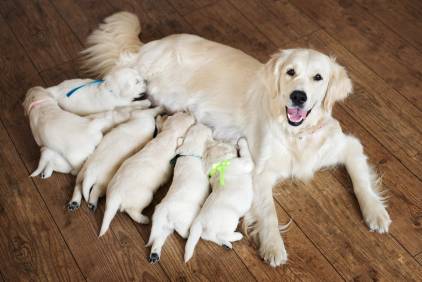Connect with a verified veterinarian in minutes. Licensed vets are available 24/7 to answer your questions. No need to worry about your furry family member.
It’s not pleasant to think about, but sometimes female dogs reject their puppies. It can happen for many reasons. The mother dog may not reject just one puppy but her entire litter. But why? What causes a female dog to reject her puppies?
Are you dealing with a female dog that has rejected her puppies? If so, you’ve come to the right place. We understand this is a trying time for you and your canine companion.
We’ve put together some information about why female dogs reject their puppies. Let’s get started.
What Causes a Mother Dog to Reject Her Puppies?
There are several reasons a female dog may reject her puppies, including:
1. Female Dog is Sick
Female dogs that reject their puppies may do so because they are sick. Mother dogs can suffer from a condition called mastitis. Mastitis is caused by an infection in the mammary glands. If the mother dog develops this condition, her milk will become poisoned, and she’ll be unable to feed her puppies.
Mother dogs can also develop another medical issue called metritis. Metritis is a bacterial infection of the uterus, which can cause the female dog to reject her puppies.
2. Lack of Maternal Instincts
It sometimes happens that a female dog may not have the mothering instincts needed to care for her puppies. This is especially the case if the mother dog gave birth via cesarean section. The C-section may cause the dog not to produce oxytocin, which is a hormone created by the mother dog’s body after she gives birth. The hormone signals to her brain she needs to care for the puppies.
And if a female is too young to have puppies, she may also lack maternal instincts and reject her puppies.
3. Too Many Puppies
Another common problem for mother dogs is that they may have too many puppies to care for. She may reject one or two puppies or the entire litter if she is overwhelmed.
4. Not Enough Privacy
Mother dogs may also reject their puppies if they feel there’s not enough privacy. They may feel as if too much attention and noise could be a threat to her and the puppies. So, the female dog rejects her puppies.
What to Do If a Female Dog Rejects Her Puppies
If the mother dog shows any signs of illness, it’s imperative to have her checked and treated by the vet. Some infections can become deadly to her and her puppies.
In addition, if the puppies are otherwise healthy, it will be necessary to rear them by hand if the mother will not care for them. Here, again, it’s best to get advice and guidance from the vet on how to properly care for and feed the puppies.
There may be some sad cases where the puppies are not healthy and can’t be saved. In that case, it’s best to take them to the vet to be euthanized. No puppy should ever have to suffer.
Connect with a verified veterinarian in minutes. Licensed vets are available 24/7 to answer your questions. No need to worry about your furry family member.

Julie
Julie is a graduate of the University of North Carolina, Wilmington, where she studied Animal science. Though contrary to the opinion of her parents she was meant to study pharmacy, but she was in love with animals especially cats. Julie currently works in an animal research institute (NGO) in California and loves spending quality time with her little cat. She has the passion for making research about animals, how they survive, their way of life among others and publishes it. Julie is also happily married with two kids.
Review symptoms, medications & behavior to keep your pets healthy with a Vet Online in just minutes.
Ask a Vet Live Now

